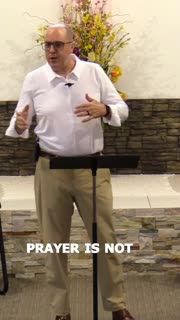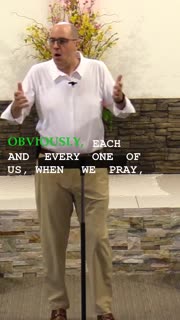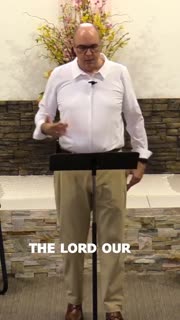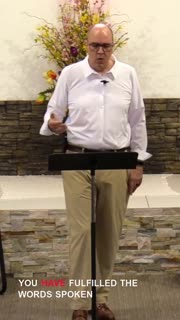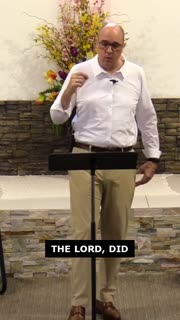Embracing Prayer: A Lifestyle of Connection with God
Devotional
Sermon Summary
Bible Study Guide
Sermon Clips
1. "Prayer is not something that you learn about, but it's something that you do. It's a lifestyle. So we started off with this series, why should we pray, right? Second week was why don't we pray? Third week was the tools that we ought to use to pray. And today we're going to focus on four types of prayer that every believer should have." [00:00] (26 seconds)
2. "Our setting this morning is like this, and it's been like this through this entire series, because I want you to grasp that prayer is not just a tool that you must do, kind of put it off your checklist, but it's more of a getting together with a good friend. Just imagine your best friend sitting over there, and you're sitting over here, and you're spending hours and hours talking. Reminiscing, questioning, looking to the future. Just imagine having that relationship with God." [01:16] (35 seconds)
3. "Many of us, sadly, and this is a trick of the devil, and that is, well, you sinned. You did all these things, and now you just want to talk to God? Do you think God is listening? I don't know about you, but I had those questions very early on in my life, and every now and then they still pop up, right? After all you did, after all you said, you still think God is listening to you? You cannot believe that the Almighty Creator is listening to you." [02:25] (33 seconds)
4. "So we know that he does listen, and many times what we think is a hindrance to us for coming to the throne of the Lord is actually a way of God saying, you know what, even though, and despite all the things that you've done, I will still listen. I will still listen, and I will still reach out to you. We saw this last week in the life of Jonah, right? God said, go this way, he went that way, and he couldn't care less. He wasn't like, oh God, I want to hear you as I flee from you. Jonah never said that. He couldn't, like, he was gone. He wanted to take off." [03:22] (36 seconds)
5. "In the survey that was sent out, one of the questions was, how long do you pray every day? How much time do you spend praying every day? Do you know what the number one answer was? Don't single yourself out. Right? I've said this. Don't do that. The number one answer was between five and ten minutes. Most of you, the majority said, I pray daily, regularly, between five and ten minutes. I'm not saying that's a good thing or a bad thing, but I'm just saying that is the temperature that I got from our people that said, you know what, my prayer life is about condensed, is about that long." [04:11] (44 seconds)
6. "Obviously, each and every one of us, when we pray, we can always say, you know what? I wish I could pray longer. Right? I wish I could pray more. Today, we're going to look at four types of prayer that if you tackle each and every one of them, your five minutes can turn into 20 minutes just like that." [04:11] (18 seconds)
7. "The Lord our God is merciful and forgiving, even though we have rebelled. We have not obeyed the Lord, our God, or kept the laws he gave us through his servants, the prophets. All Israel has transgressed your laws and turned away, refusing to obey you. Therefore, the curses and sworn judgments written in the law of Moses, the servant of God, have been poured out in us, because we have sinned against you." [06:09] (32 seconds)
8. "You have fulfilled the words spoken against you, against us, and against our rulers, by bringing on us great disaster. Under the whole heaven, nothing has ever been done like what has been done to Jerusalem. Just as it is written in the law of Moses, all these disasters have come upon us. Yet we have not sought the favor of the Lord, our God, by turning from our sins and giving attention to your truth." [07:14] (33 seconds)
9. "Now, our God, hear the prayers and petitions of your servant. For your sake, Lord, look with favor on your desolate sanctuary. Give ear, our God, and hear, open your eyes, and see the desolation of the city that bears your name. We do not make requests from you because we are righteous, but because of your great mercy. Listen. Lord, forgive. Lord, hear and act. For your sake, my God, do not delay, because your city and your people bear your name." [08:15] (36 seconds)
10. "The Lord, did not hesitate to bring the disaster on us. For the Lord, our God, is righteous in everything he does, yet we have not obeyed him. Now, Lord, our God, who brought your people out of Egypt, with a mighty hand, and who made for yourself a name that endures to this day, we have sinned, we have done wrong. Lord, in keeping with all your righteous acts, turn away your anger and your wrath from Jerusalem, your city, your holy hill. Our sins and the iniquities of our ancestors have made Jerusalem and your people an object of scorn to all those around us." [07:14] (44 seconds)
Ask a question about this sermon
2. "Our setting this morning is like this, and it's been like this through this entire series, because I want you to grasp that prayer is not just a tool that you must do, kind of put it off your checklist, but it's more of a getting together with a good friend. Just imagine your best friend sitting over there, and you're sitting over here, and you're spending hours and hours talking. Reminiscing, questioning, looking to the future. Just imagine having that relationship with God." [01:16] (35 seconds)
3. "Many of us, sadly, and this is a trick of the devil, and that is, well, you sinned. You did all these things, and now you just want to talk to God? Do you think God is listening? I don't know about you, but I had those questions very early on in my life, and every now and then they still pop up, right? After all you did, after all you said, you still think God is listening to you? You cannot believe that the Almighty Creator is listening to you." [02:25] (33 seconds)
4. "So we know that he does listen, and many times what we think is a hindrance to us for coming to the throne of the Lord is actually a way of God saying, you know what, even though, and despite all the things that you've done, I will still listen. I will still listen, and I will still reach out to you. We saw this last week in the life of Jonah, right? God said, go this way, he went that way, and he couldn't care less. He wasn't like, oh God, I want to hear you as I flee from you. Jonah never said that. He couldn't, like, he was gone. He wanted to take off." [03:22] (36 seconds)
5. "In the survey that was sent out, one of the questions was, how long do you pray every day? How much time do you spend praying every day? Do you know what the number one answer was? Don't single yourself out. Right? I've said this. Don't do that. The number one answer was between five and ten minutes. Most of you, the majority said, I pray daily, regularly, between five and ten minutes. I'm not saying that's a good thing or a bad thing, but I'm just saying that is the temperature that I got from our people that said, you know what, my prayer life is about condensed, is about that long." [04:11] (44 seconds)
6. "Obviously, each and every one of us, when we pray, we can always say, you know what? I wish I could pray longer. Right? I wish I could pray more. Today, we're going to look at four types of prayer that if you tackle each and every one of them, your five minutes can turn into 20 minutes just like that." [04:11] (18 seconds)
7. "The Lord our God is merciful and forgiving, even though we have rebelled. We have not obeyed the Lord, our God, or kept the laws he gave us through his servants, the prophets. All Israel has transgressed your laws and turned away, refusing to obey you. Therefore, the curses and sworn judgments written in the law of Moses, the servant of God, have been poured out in us, because we have sinned against you." [06:09] (32 seconds)
8. "You have fulfilled the words spoken against you, against us, and against our rulers, by bringing on us great disaster. Under the whole heaven, nothing has ever been done like what has been done to Jerusalem. Just as it is written in the law of Moses, all these disasters have come upon us. Yet we have not sought the favor of the Lord, our God, by turning from our sins and giving attention to your truth." [07:14] (33 seconds)
9. "Now, our God, hear the prayers and petitions of your servant. For your sake, Lord, look with favor on your desolate sanctuary. Give ear, our God, and hear, open your eyes, and see the desolation of the city that bears your name. We do not make requests from you because we are righteous, but because of your great mercy. Listen. Lord, forgive. Lord, hear and act. For your sake, my God, do not delay, because your city and your people bear your name." [08:15] (36 seconds)
10. "The Lord, did not hesitate to bring the disaster on us. For the Lord, our God, is righteous in everything he does, yet we have not obeyed him. Now, Lord, our God, who brought your people out of Egypt, with a mighty hand, and who made for yourself a name that endures to this day, we have sinned, we have done wrong. Lord, in keeping with all your righteous acts, turn away your anger and your wrath from Jerusalem, your city, your holy hill. Our sins and the iniquities of our ancestors have made Jerusalem and your people an object of scorn to all those around us." [07:14] (44 seconds)
